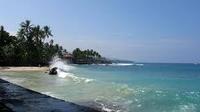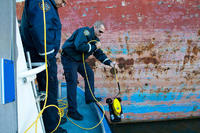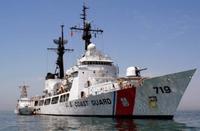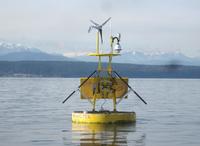-
New cargo screening unveiled
Smiths Detection’s new HCVMe uses the power of a 4MeV X-ray accelerator and can scan loaded cargo containers with a steel penetration of 200 mm
-
-
Coast Guards blocks Hawaii bay to protect president

The Coast Guard has established a security zone in the waters of Kailua Bay to protect the president on his family during their holiday vacation; unauthorized people entering the zones are subject to penalty of $40,000 for each violation or a criminal penalty resulting in imprisonment of twenty-five years; the exclusion zone will be in effect until 7 January
-
-
Underwater drones help NYPD secure harbor

The New York Police Department (NYPD) has a new high-tech ally in its fight to keep the city safe from terrorists; to help sweep the city’s waterways and bridges of dangerous bombs, the NYPD’s Harbor Unit recently acquired six unmanned underwater drones that help sniff out explosives
-
-
Underwater drones help police keep harbors safe
Growing attention to underwater security along U.S. coasts has resulted in an increasing reliance on a relatively new tactical weapon for the police: an unmanned submersible drone, often referred to as a remote-operated vehicle, or ROV. The NYPD has six of these underwater drones, similar to those in use by the United States military and by oil companies with offshore operations.
-
-
U.S. deploys radiation detectors in Chinese port
As part of its ongoing efforts to secure terrorists from attacking the global shipping system via cargo container, the United States recently reached an agreement to deploy radiation scanners at the world’s largest container processing port in Shanghai
-
-
Pierce County Washington effort to upgrade marine fleet stymied by cost
The Pierce County Sheriff’s Department needs a new patrol boat. The problem? A $730,000 price tag which has county officials balking
-
-
Delaware launches marine security unit

Last week, Delaware showed off the latest additions to its law enforcement arsenal, two new high-tech boats aimed at protecting the state’s waterways and critical infrastructure; the boats come with the announcement of a new maritime patrol unit that will be staffed by three full-time state troopers and two part-timers
-
-
BSI will develop new system for screening cargo
DHS Science and Technology Directorate (S&T) has awarded a contract to BSI Group’s Supply Chain Solutions business unit for the creation of a protocol to aid the screening of cargo at U.S. ports
-
-
Somali pirates adapt and thrive
Somali pirates have grown bolder and more clever in adapting to world attempts to curtail piracy; last month, they recorded their first hijacking of a ship anchored in port; total costs of piracy now reach $12B
-
-
Poor oversight, cost overruns plague Coast Guard’s modernization efforts

More than $7 billion and ten years later, the U.S. Coast Guard has only built two ships out of its original twenty-five year, $24.2 billion plan to replace its aging fleet with more than 250 new or upgraded vessels; given the service’s procurement track record, Congress is hesitant to continue funding a program plagued by cost overruns, delays, and management problems
-
-
CBP, railroad settles smuggling dispute

Smugglers use trains which go from Mexico to the United States to smuggle drugs and other contraband. In the last few years, the U.S. Customs and Border Protection agency (CBP) has imposed fines totaling millions of dollars on Union Pacific Railroads for carrying the smuggled goods — even though UP maintained it knew nothing about the illegal shipments; CBP and UP have now settled their dispute
-
-
USSI showcases port security system
To help secure U.S. ports and waterways which provide a vital link to the global supply chain, US Seismic Systems Inc. (USSI) has developed an underwater fiber-optic sonar system that detects small craft entering protected areas
-
-
Making rail travel more reliable
U.K. researchers are collaborating with industry to develop novel optical sensors that detect when overhead power lines are likely to fail; the costly disruption to rail travel caused by the breakdown of overhead power lines could thus become a thing of the past
-
-
New task force helps protect Port of Virginia
A new border security task force has been launched to help secure the Port of Virginia; the task force is comprised of ten officers and agents from a total of ten local, state, and federal agencies that will be responsible for securing the Port of Virginia against a variety of criminal acts including trade fraud, cargo theft, and the illegal smuggling of drugs, persons, currency, and weapons
-
-
Buoy system helps protect U.S. ports

With America’s ports, waterways, and vessels handling more than $700 billion in goods annually, a terrorist attack on the system would have a crippling effect on the U.S. economy; to help mitigate these threats, Intellicheck Mobilisa has developed Aegeus, a series of buoys which have the capability of creating a surveillance perimeter that detects incoming vessels, biological substances, and even nuclear bombs
-
- All
- Regional
- Water
- Biometrics
- Borders/Immig
- Business
- Cybersecurity
- Detection
- Disasters
- Government
- Infrastructure
- International
- Public health
- Public Safety
- Communication interoperabillity
- Emergency services
- Emergency medical services
- Fire
- First response
- IEDs
- Law Enforcement
- Law Enforcement Technology
- Military technology
- Nonlethal weapons
- Nuclear weapons
- Personal protection equipment
- Police
- Notification /alert systems
- Situational awareness
- Weapons systems
- Sci-Tech
- Sector Reports
- Surveillance
- Transportation
Advertising & Marketing: advertise@newswirepubs.com
Editorial: editor@newswirepubs.com
General: info@newswirepubs.com
2010-2011 © News Wire Publications, LLC News Wire Publications, LLC
220 Old Country Road | Suite 200 | Mineola | New York | 11501
Permissions and Policies
Editorial: editor@newswirepubs.com
General: info@newswirepubs.com
2010-2011 © News Wire Publications, LLC News Wire Publications, LLC
220 Old Country Road | Suite 200 | Mineola | New York | 11501
Permissions and Policies
